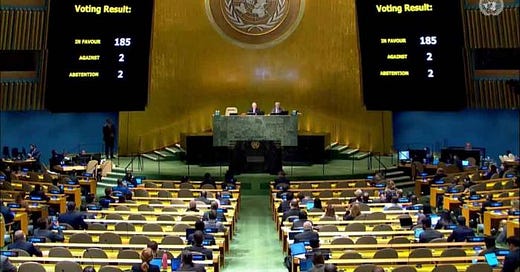There is a saying among mothers in Cuba, “I have said it thirty times; when are you going to do it?” With the November 3 voting in the General Assembly of the United Nations, we arrive to thirty consecutive years that the Assembly has approved the resolution, “The need to put an end to the financial, commercial, and economic blockade by the United States of America against Cuba.” This year, 185 nations voted in favor of the resolution, two opposed (United States and Israel), and two abstained (Brazil and Ukraine).
Immediately before the voting, numerous representatives of governments from all regions of the world took the podium to denounce the blockade. To mention just a few, South Africa pointed out that Cuba has been helping the countries in development in an unselfish form, yet the sanctioning of Cuban transactions prevents Cuba from acquiring medicine, supplies, and equipment for its own nation. Algeria asserted that the blockade is contrary to the basic principl…



